Getting a tattoo is an important decision that can be difficult to explain to your parents. If you’re wondering how to tell your parents you got a tattoo, you’re not alone. It can be a tough conversation to start, but the right approach can help make the process easier. This article will provide you with proven strategies to help get the conversation started when you tell your parents you got a tattoo.
Contents
Preparation for Telling Your Parents

Choose the Right Moment – Make sure to have the conversation in an environment and time when both of your parents are available and in a good mood.
Stay Calm – Even if you are feeling anxious, try to stay calm when you tell them.
Be Respectful – Respect your parents’ opinions, even if they don’t agree with your decision.
Be Prepared for Questions – Be prepared to answer questions about why you got the tattoo, who did it, and how much it cost.
Be Honest – Be honest about why you got the tattoo, and how it makes you feel.
Be Clear About Your Intentions – Make sure your parents understand that you are not trying to rebel or disrespect them, but rather make a statement about who you are.
Be Open to Suggestions – Be open to suggestions from your parents, such as covering it up or having it removed.
Understanding Your Parents’ Perspectives

Before you approach your mom or dad to tell them you got a tattoo, take the time to reflect on their individual personalities and values. Think about why they might disapprove, such as concerns about your health, cultural and religious beliefs, or worries that you regret it in the future. It is also important to consider how they will react to the news.
Bear in mind that your parents may be coming from a place of worry and concern. They may be afraid of the risks involved with tattoos and piercing, such as skin infections and allergic reactions. They may also be concerned that the tattoo may reflect badly on your future job prospects.
At the same time, consider that your parents may be uncomfortable because of their own beliefs. For example, if you have a religious background, your parents may think that getting a tattoo goes against their faith. This can lead to feelings of guilt, shame, and disappointment, which can be hard to overcome.
Before you tell your parents about your tattoo, take some time to try to understand their perspectives. This will help you be better prepared for the conversation and give you the best chance of getting your parents to understand and accept your decision.
Sometimes, it can be helpful to talk to someone who has experienced a similar situation. Ask a close friend or family member if they have ever had to tell their parents they got a tattoo. If so, they may be able to offer advice on how to tell your mom or dad about your tattoo and how to handle their reaction.
Choosing the Right Time and Place

It’s important to pick the right time and place to tell your parents that you have a tattoo. It should be done in a comfortable and private setting, with both parents present. To ensure the conversation is productive, try to reach out to your parents during a time when they are relaxed and not too busy. Do not approach them during a stressful time, such as when they are about to leave for work or are in the middle of a disagreement.
Making sure that your parents are prepared for the conversation is also important. It is best to warn them before beginning the conversation, as it will give them the opportunity to prepare themselves for the conversation and the potential backlash. You can try to explain the reasons for your decision to get a tattoo and provide them with resources and advice on how to convince your child not to get a tattoo. This will help your parents to understand your decision better.
Having a Plan

When it comes to telling your parents you got a tattoo, it’s important to have a plan in place. It’s important to address the conversation in a respectful way and to make sure that you are not just blurting out the news. It’s important to consider how should I handle my daughter getting a tattoo and approach the conversation in a way that shows respect and understanding.
Be Respectful: Show your parents respect by being honest and open about your decision. It’s also important to consider their feelings about tattoos and show that you understand their concerns.
Be Prepared: Think through the conversation ahead of time and be prepared to answer any questions that your parents may have. Consider addressing any potential issues or concerns that your parents may have about tattoos.
Be Confident: It’s important to be confident in your decision and not to waver when discussing it with your parents. You may want to explain why you chose to get a tattoo and what it means to you.
Be Understanding: Be open to hearing your parents’ concerns and be willing to listen to their advice. It’s important to understand that they may have a different opinion on tattoos and that you may need to compromise in order to come to a resolution.
Be Open to Compromise: If your parents have an issue with your decision, be willing to come to a compromise. You may need to agree to certain rules and restrictions in order to move forward with getting a tattoo.
Have a Plan: It’s important to have a plan in place before discussing the tattoo with your parents. Consider how you will handle any potential issues and how you will move forward if your parents are not on board with the decision.
How to Start the Conversation

Be honest. It’s important to start the conversation with your parents by being honest. Explain why you got the tattoo, why it’s important to you, and what it means. Being honest and open will help build a stronger relationship with your parents.
Set the tone. Your parents may be surprised when you tell them about your tattoo, so it’s important to set the tone for the conversation. Be prepared and speak calmly so your parents don’t feel like you are trying to hide anything or are being evasive.
Be prepared. Before you start the conversation, it’s important to be prepared. Have an answer ready for any questions your parents may have and be ready to address any concerns they may have.
Explain why. It’s important to explain to your parents why you got the tattoo. Explain what it means to you and how it reflects who you are. This will help them understand your decision and may even help them to be more supportive.
Acknowledge their feelings. It’s important to acknowledge how your parents are feeling and to be understanding. Listen to their concerns and try to be understanding and respectful.
Be patient. Your parents may not be supportive of your decision right away, so it’s important to be patient. Take the time to explain your decision and be open to their feedback.
Be Honest and Direct
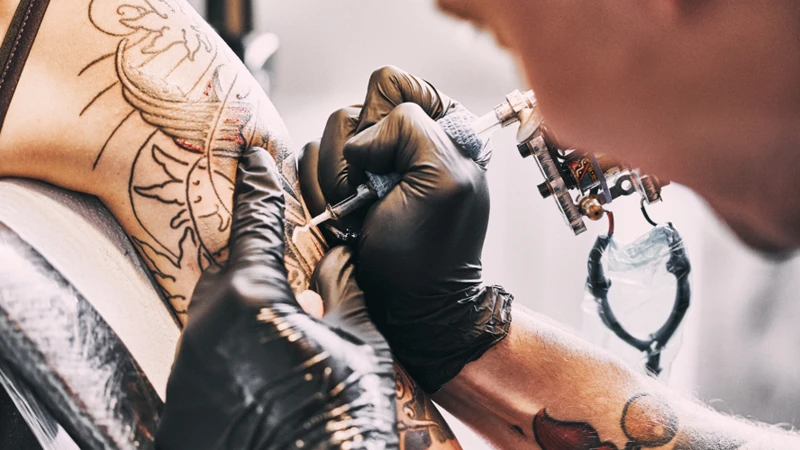
Explain the Tattoo: Begin the conversation by explaining why you got the tattoo. Discuss the symbolism and the meaning it holds for you. Being honest and open with your parents will demonstrate that the decision was a meaningful one and that it wasn’t simply a spur of the moment whim.
Be Respectful and Understanding: Show that you understand and respect your parents’ opinions, even if you do not agree with them. Let them know that you are open to having a healthy and constructive dialogue about the issue.
Explain Your Reasons: Explain why it is important for you to have the tattoo and how it helps to express who you are as a person. Be honest about your motivations and how it has positively impacted your life.
Be Prepared for Negative Reactions: Not all parents will respond positively to their child getting a tattoo. Be prepared to hear negative reactions and be open to hearing the reasons behind the reaction.
Be Open to Compromise: If your parents are not happy with you getting a tattoo, be open to discussing ways in which you can compromise. If they are concerned about the placement, suggest that you get a smaller tattoo in a less visible place. Show them that you are willing to work together to find a solution that satisfies both parties.
Be Prepared to Answer Questions

No matter how prepared you are to tell your parents about your tattoo, it is likely that they will have questions for you. You should be prepared to answer them honestly and openly. Here are some of the questions they may ask:
Why did you get a tattoo? Think about why you got the tattoo before you have the conversation. Be honest, but don’t go into too much detail if you don’t feel comfortable doing so.
What does the tattoo mean to you? Think about what the tattoo means to you before having the conversation. Explain why the tattoo is meaningful to you, and why you chose it.
Are you sure this is what you want? Your parents may be concerned that you are not making a wise decision. Reassure them that you are sure this is what you want and that you have thought it through carefully.
Are you aware of the risks? Explain that you are aware of the risks associated with tattoos, such as infections and allergic reactions. Let them know that you took all necessary precautions to ensure your safety.
Are you prepared to live with this decision? Explain that you understand that the decision to get a tattoo is permanent and that you are prepared to live with it. Let your parents know that you understand the implications of your decision and are willing to accept the consequences.
By being prepared to answer their questions, you can have a more productive conversation with your parents about your tattoo.
Be Respectful

- Acknowledge that, while you may not agree with your parents’ opinion on tattoos, they are entitled to their views.
- Avoid getting into an argument over the tattoo. Respectfully explain why you chose to get it and why it is important to you.
- Be patient and understanding. Respect your parents’ right to set boundaries and provide advice.
- Listen to their concerns without getting defensive. Validate their feelings and respond with understanding.
- Be honest and open about your decision. Don’t hide the truth or lie about the tattoo.
- Show your parents that you respect their opinions by taking their advice into consideration.
- Thank your parents for their support and understanding. Appreciate them for their love and guidance.
Dealing With Disapproval

It’s likely that your parents won’t be happy that you got a tattoo. It’s important to remember that their initial reaction is likely based on their own fears and worries. It’s important to give them the time and space to express their feelings and be willing to listen to their concerns without getting defensive.
If your parents express disapproval of your tattoo, try to understand why. Consider their values and beliefs when responding. Offer to answer any questions they may have. Show them that you are willing to work together to resolve the situation.
It’s also important to remember that your parents’ opinion isn’t the only one that matters. You have the right to make decisions about your body. Remain firm, yet respectful if your parents do not agree with your decision.
If your parents are unwilling to accept your decision, it may be helpful to speak to a trusted adult or a therapist. A professional can help you work through the issue and provide guidance on how to handle the situation.
Establish Limits
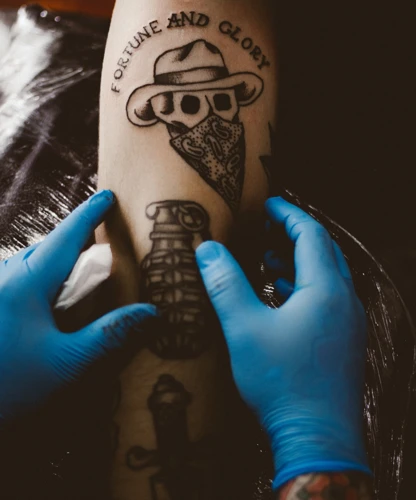
When it comes to tattoos, it is important to set boundaries with your parents. Let them know that you respect their opinion but that you are an adult and need to make your own decisions. Explain that you understand the risks and that you are committed to taking the necessary safety precautions. If necessary, offer to consult with a professional tattoo artist to ensure the safety of the procedure. Additionally, be open to discussing any restrictions they would like to place on future tattoos. By showing that you are willing to compromise, you may be able to come to a mutually agreeable solution.
Listen to Their Concerns

- Acknowledge their fear: Your parents may be scared of your decision to get a tattoo, and it’s important to acknowledge their fear. Let them know that you understand why they may be feeling anxious and remind them that you are an adult now and can make your own decisions.
- Be open to their opinions: Even though you are an adult, your parents may still have opinions about the tattoo that you should consider. Ask them to explain their concerns, and try to be understanding of their perspective. This shows that you respect their opinion and are willing to listen.
- Don’t be defensive: It’s important to stay respectful and not be defensive. If your parents have a different opinion than you, try to understand why they feel that way and be willing to listen to their point of view. This will help you have a productive conversation and come to a resolution.
- Be honest: Above all else, be honest with your parents about your decision to get a tattoo. Explain why you want it and what it means to you. This will help them understand why you made this decision and hopefully make them more supportive.
Respect Their Decision

- Understand that your parents may be worried about your safety and health. Tattoos are permanent and can cause serious health risks, such as infection and allergic reactions.
- Be Honest with your parents about why you got the tattoo and why it’s important to you.
- Listen to your parents’ concerns and acknowledge their feelings.
- Be Prepared to answer any questions they have about the process and safety precautions you took.
- Remain Respectful of their decision. Even if their response is not positive, remember that they are trying to protect you.
Talking to Your Child About Getting a Tattoo
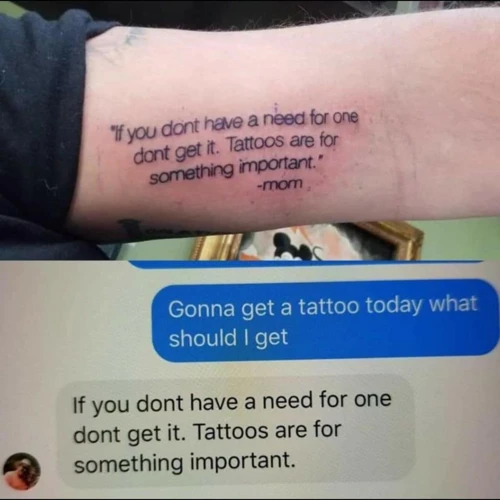
1. Explain the Consequences
- Discuss the potential risks associated with getting a tattoo, such as infection and scarring.
- Explain that tattoos are permanent and can be difficult and costly to remove.
- Explain the legal consequences, if applicable, such as parental consent laws.
2. Talk about Respect for Self and Others
- Discuss how a tattoo can be seen as a form of self-expression, but also how it can be seen as disrespectful to others.
- Encourage your child to consider how a tattoo might be seen by future employers.
3. Talk about Making Good Decisions
- Discuss how a tattoo is a decision that is best made when your child is older and more mature.
- Encourage your child to think through the decision carefully before making it.
- Encourage your child to consider whether the decision is one they will still be happy with in the future.
4. Set Boundaries
- Set clear expectations regarding when and where your child is allowed to get a tattoo.
- Explain that you will be involved in the process if your child decides to move forward with getting a tattoo.
- Explain that you will need to approve the design and location of any tattoo before it is done.
Explain the Risks
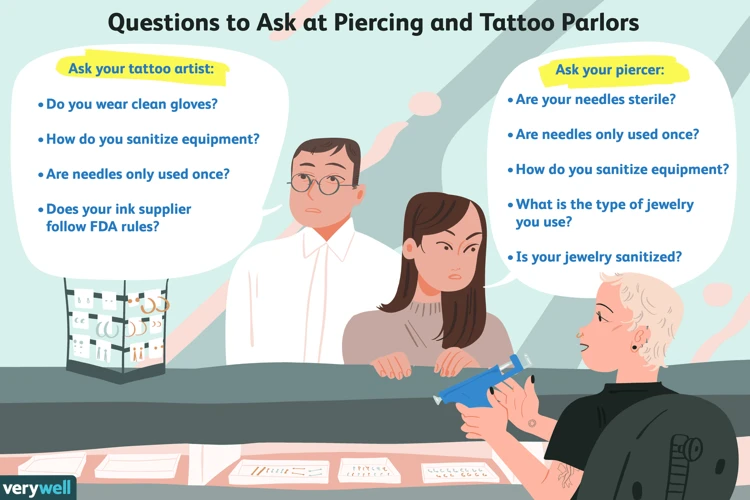
When talking to your parents about your decision to get a tattoo, it is important to explain the risks associated with getting inked. This includes potential long-term health risks such as skin cancer, infections, and allergic reactions. Additionally, tattoos can be difficult and expensive to remove if you change your mind. Make sure to explain that you have taken steps to mitigate the risks, such as going to a reputable tattoo parlor and discussing the safety protocols with the artist. You may also want to explain that getting a tattoo is a personal decision that you have thought through carefully, and that you are comfortable with the risks.
Provide Alternatives
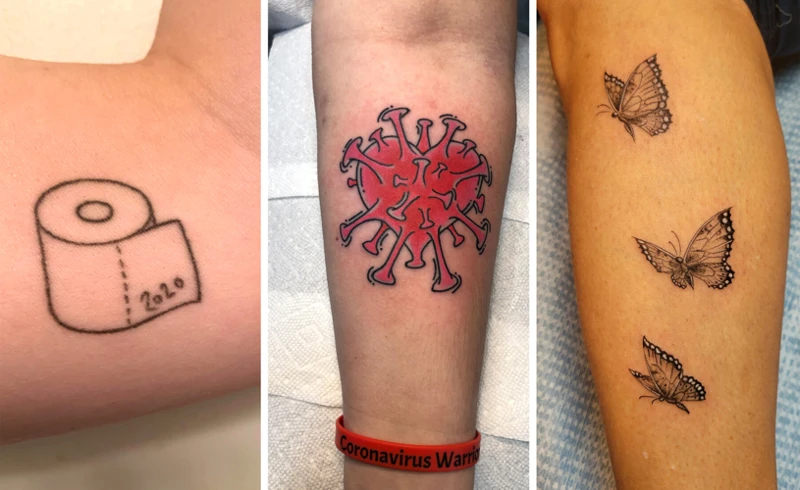
If you are not sure how your parents will react to the news of your tattoo, consider providing them with alternatives. For instance, you could suggest getting a henna tattoo instead. Henna tattoos last for a period of two to four weeks and can be a great way to express yourself without making a permanent decision. If you are not sure about a particular design, you could also look into getting a temporary tattoo. These tattoos can be easily removed and do not carry the same risks associated with permanent tattoos.
If you are worried that your parents will not be supportive of you getting a tattoo, you could also suggest a compromise. You could suggest that you get a tattoo that is small and discreet or one that can be easily concealed. This way, you can still express yourself without having to worry about upsetting your parents.
Set Ground Rules
- Be Respectful: Respect your parents’ opinions and feelings. As much as you want them to respect your decisions, you also need to be respectful of theirs.
- Listen: Listen carefully to what your parents are saying and make sure you understand their perspective.
- Be Open: Be open to their suggestions and feedback. Don’t be stubborn and be willing to compromise.
- Be Honest: Be honest about why you got the tattoo and explain why it is important to you.
- Discuss Responsibilities: Discuss who will be responsible for the cost of removal or touch-ups.
Setting ground rules before talking to your parents about your tattoo is essential to ensure that the conversation is productive and respectful. Make sure to set reasonable expectations of each other, and be open to their suggestions and feedback. Be honest about why you got the tattoo and explain why it is important to you. Discuss who will be responsible for the cost of removal or touch-ups.
Frequently Asked Questions
How can I prepare for the conversation with my parents about my tattoo?
- Be Honest: Be honest with your parents about why you got the tattoo and what it means to you. Explain your thought process in a calm and respectful manner.
- Be Respectful: Respect your parents’ opinions and demonstrate that you understand their concerns. Show them you are mature and responsible and that you understand the consequences of your actions.
- Be Understanding: Understand your parents’ point of view and try to see things from their perspective. Avoid getting into a heated argument and remain calm.
- Be Prepared: Prepare for the conversation by anticipating their questions and concerns. Think of how you will respond to their questions and how you will explain your decision.
- Be Open: Be open to their questions and be willing to listen to their concerns. Ask for their advice and be open to their suggestions.
- Be Reasonable: Be reasonable and don’t expect your parents to be okay with your decision right away. Give them time to process the information and be willing to compromise.
- Be Patient: Be patient and don’t rush the conversation. Allow your parents to ask questions and express their opinions without cutting them off or becoming defensive.
What is the Best Way to Approach My Parents About My Tattoo?
The best way to approach your parents about your tattoo is to be honest and forthright. Explain why you wanted to get the tattoo and why it is meaningful to you. Be prepared to answer any questions your parents may have and be willing to listen to their concerns. Additionally, show that you have thought through the decision and have taken the necessary precautions to care for your tattoo. Lastly, be understanding and respectful of their opinion, even if it is different from your own.
Is there a way I can tell my parents so that they are less likely to be upset?
- Start with an apology.
- Be honest and provide explanations.
- Allow them to express their feelings.
- Offer to talk more about it.
- Listen to their concerns.
- Be prepared for consequences.
Let your parents know that you understand why they might be upset and that you are sorry for not discussing your decision with them beforehand.
Explain why you got a tattoo, and be honest about why you feel like it was a good decision for you. Explain that you understand why they may be upset and that you care about their opinion.
Allow your parents to express their emotions and opinion without judgment or interruption. Respect their feelings, even if you don’t agree with them.
Let your parents know that they can come to you with any questions or concerns they may have, and that you are happy to talk more about it.
Listen to your parents’ concerns and take them seriously. This will demonstrate that you value their opinion and respect their feelings.
Be prepared for some consequences, such as a lecture or a temporary grounding. Respect their decision and show that you understand why they are upset.
What should I do if my parents are still angry or disappointed with my decision to get a tattoo?
Listen to their concerns: Make sure to give your parents the chance to express their feelings without interruption. It’s important to understand where they are coming from and why they are so upset.
Apologize: If you feel that you have made a mistake, apologize for it. Even if you don’t think you did anything wrong, it’s important to show your parents that you are sorry for hurting their feelings.
Explain why you wanted the tattoo: Explain your motivations and how the tattoo reflects your personality. Make sure to explain that it was a thoughtful decision that you made.
Reassure them: Let your parents know that you take responsibility for your decisions and that you are ready to face the consequences.
Ask for their support: Ask your parents to respect your decision and to support you in the future.
Be patient: It may take some time for your parents to come around to your decision, so be patient and give them the space they need.
Is there a way to ensure my parents understand the meaning behind my tattoo?
- Explain why you got the tattoo. Talk about why you chose the design and what it means to you. If you have a religious or spiritual importance to the tattoo, make sure to explain that as well.
- Share your plans for taking care of it. Show that you understand the commitment required for tattoo care and the potential health risks associated with tattoos.
- Make sure your parents understand the permanence. Explain that tattoos are very difficult to remove and that they will be with you for life.
- Be patient and respectful. Listen to your parents’ concerns and take their opinions into consideration. Show that you value their opinion and that you respect their beliefs.
- Be prepared to compromise. If your parents are adamantly against the tattoo, be prepared to compromise. You might agree to get a smaller tattoo, or one that is less visible, or to wait until you are of legal age to get the tattoo.
Conclusion
Telling your parents that you got a tattoo can be a difficult conversation, but having a strategy in place will help make it easier. Start by knowing what you want to say and why, and then practice the conversation. When it’s time to talk to your parents, take it slow, be prepared to answer questions, and don’t be afraid to talk about your feelings. Ultimately, your parents may not be thrilled, but they will likely appreciate your honesty and respect your bravery.